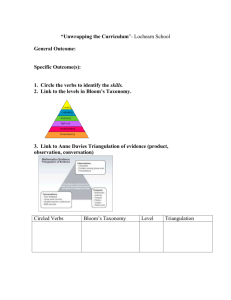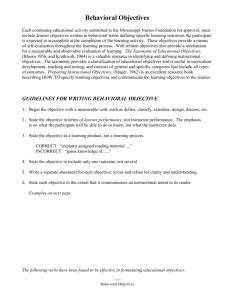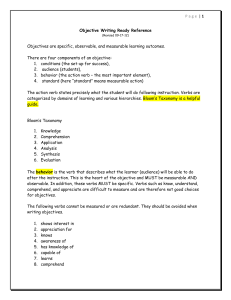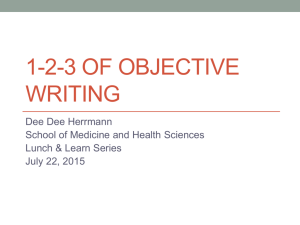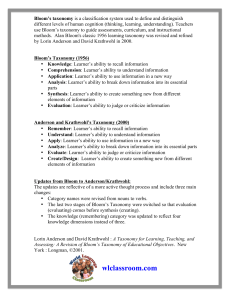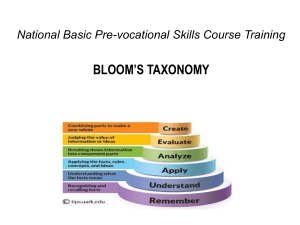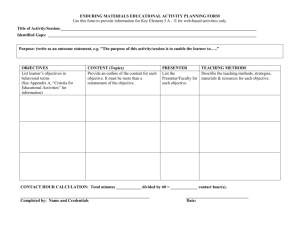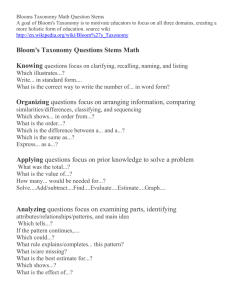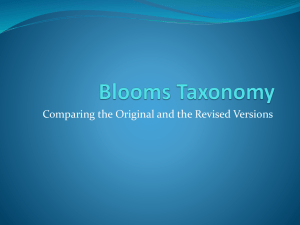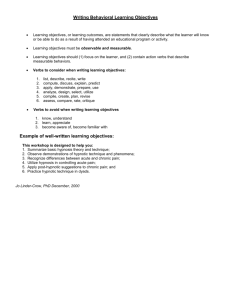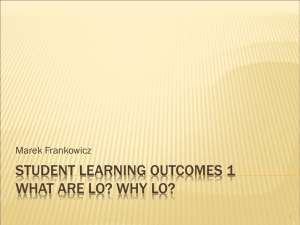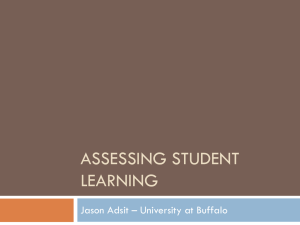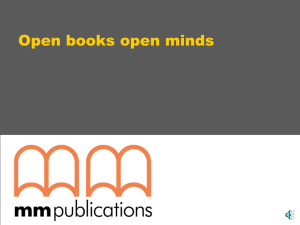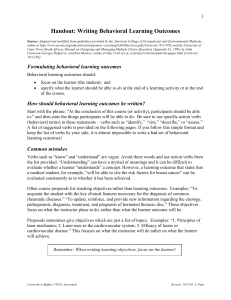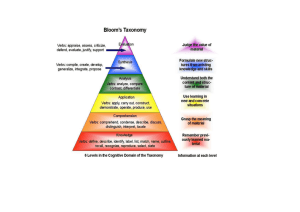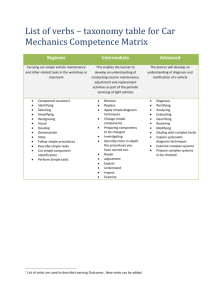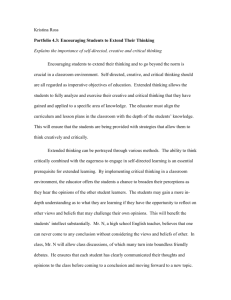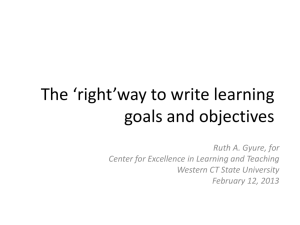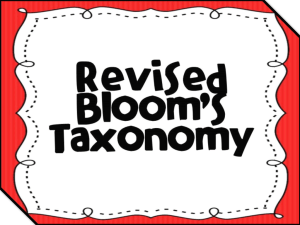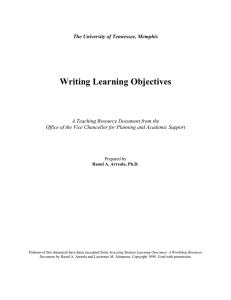Learning Outcomes Tip Sheet 2015
advertisement
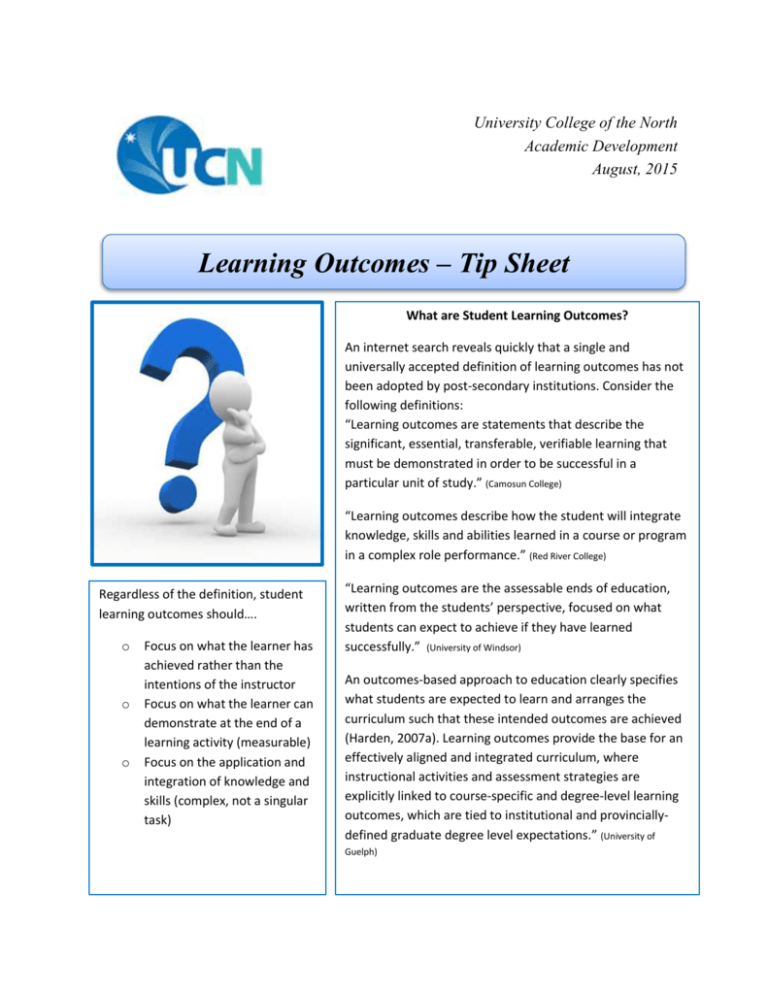
University College of the North Academic Development August, 2015 Learning Outcomes – Tip Sheet What are Student Learning Outcomes? An internet search reveals quickly that a single and universally accepted definition of learning outcomes has not been adopted by post-secondary institutions. Consider the following definitions: “Learning outcomes are statements that describe the significant, essential, transferable, verifiable learning that must be demonstrated in order to be successful in a particular unit of study.” (Camosun College) “Learning outcomes describe how the student will integrate knowledge, skills and abilities learned in a course or program in a complex role performance.” (Red River College) Regardless of the definition, student learning outcomes should…. o o o Focus on what the learner has achieved rather than the intentions of the instructor Focus on what the learner can demonstrate at the end of a learning activity (measurable) Focus on the application and integration of knowledge and skills (complex, not a singular task) “Learning outcomes are the assessable ends of education, written from the students’ perspective, focused on what students can expect to achieve if they have learned successfully.” (University of Windsor) An outcomes-based approach to education clearly specifies what students are expected to learn and arranges the curriculum such that these intended outcomes are achieved (Harden, 2007a). Learning outcomes provide the base for an effectively aligned and integrated curriculum, where instructional activities and assessment strategies are explicitly linked to course-specific and degree-level learning outcomes, which are tied to institutional and provinciallydefined graduate degree level expectations.” (University of Guelph) Characteristics of Good Learning Outcomes (University of Toronto) http://www.teaching.utoronto.ca/topics/coursedesign/learning-outcomes/characteristics.htm Are specific can use active language – verbs in particular – that make expectations clear. Bloom’s Taxonomy of Educational Objectives is particularly useful because it associates particular verbs with each level of learning. Although Bloom’s Taxonomy is a hierarchy, each type of learning can be a valuable aspect of a course. Below is one version of Bloom’s Taxonomy with action verbs associated with each level of learning. Are focused on the learner: rather than explaining what the instructor will do in the course, good learning outcomes describe knowledge or skills that the student will employ, and help the learner understand why that knowledge and those skills are useful and valuable to their personal, professional, and academic future Are realistic, not aspirational: all passing students should be able to demonstrate the knowledge or skill described by the learning outcome at the conclusion of the course. In this way, learning outcomes establish standards for the course. Focus on the application and integration of acquired knowledge and skills: good learning outcomes reflect and indicate the ways in which the described knowledge and skills may be used by the learner now and in the future. Indicate useful modes of assessment and the specific elements that will be assessed: good learning outcomes prepare students for assessment and help them feel engaged in and empowered by the assessment and evaluation process. Learning Outcomes Course Means Assessment Tasks (Learning Experiences & Teaching Methods) Three Essentials of Alignment: 1.Teaching methods should help students develop the knowledge and skills specified in the learning outcomes. The teaching methods are the means; the learning outcomes are the ends. 2.Assesment tasks should determine whether, and to what degree, students have achieved the learning outcomes. 3. Teaching methods, assessments, and learning outcomes should be consistent and coherent. Potter M. & Kustra, E. (2012). Course Design for Constructive Alignment. Centre for Teaching and Learning, University of Windsor Web Resources Writing Outcomes: https://myconestoga.ca/web/tlc/learn-about-program-and-course-curriculum#writingoutcomes http://cll.mcmaster.ca/COU/pdf/Brief%201%20Learning%20Outcomes.pdf http://www.rrc.ca/LearningOutcomeSupport/ For additional teaching tips, contact: Connie Wyatt Anderson, Academic Specialist cwyattanderson@ucn.ca 204-627-8634
